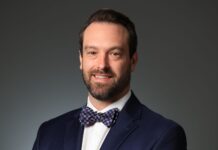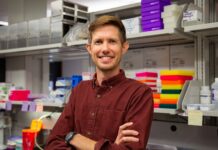LOUISVILLE, Ky. – It is never too early for medical researchers to begin obtaining funding for their work.
Heather Clair, a student in the M.D./Ph.D. program at the University of Louisville School of Medicine, has secured a five-year grant from the National Institutes of Health (NIH) to help fund her research and education. The Ruth L. Kirschstein National Research Service Award, an F30 fellowship from the NIH, is designed to support highly promising predoctoral students in a dual-doctoral degree training program such as the M.D./Ph.D. to increase the pool of highly trained clinician-scientists in biomedical research.
Clair won the grant in consultation with her mentor, Matt Cave, M.D., associate professor of medicine at UofL with expertise in liver disease and transplantation. Clair and Cave have designed a research plan to study of the effects of exposure to polychlorinated biphenyls (PCBs) on the liver. Clair will be investigating how synthetic organic chemicals change the programming of the body’s cells.
“We believe that PCBs are one of the factors leading to liver disease and other types of metabolic dysfunction – maybe diabetes, cardiovascular disease or obesity,” Clair said.
Clair earned a master’s degree in biotechnology and worked in laboratories and other settings for a number of years, including lab work at UofL. After talking with medical students who shared their enthusiasm for working with patients, Clair decided to add clinical work to her professional palette and applied to the School of Medicine.
“I wasn’t ready to leave research, however, so I applied to the M.D./Ph.D. program. When I got in, it was like winning the lottery – I get to do two things I love at the same time,” Clair said.
Earning a grant from the NIH is a precocious accomplishment for a student, preparing her to obtain grants as a professional researcher.“Just writing the grant was a tremendous learning experience,” Clair said. “When I go back to write a K award or an RO1 as an independent investigator, I will have already done it once. It also gives me the opportunity to show the NIEHS and the NIH that I can do what I said I was going to do.”
Students in the M.D./Ph.D. program study medicine for two years, followed by three to four years of doctorate-level biomedical research, finishing off with the final two years of medical school. Upon completing the program, the physician-scientists have fulfilled the requirements for both an M.D. and a Ph.D. degree and are ready to care for patients and conduct biomedical research at the doctorate level. The UofL program has 13 students, with enrollment having been as high as 22. The school receives between 80 and 100 applications each year for the two to three positions available.
“These are the best medical students and the best graduate students. Having a group of students this bright at UofL helps in every possible way with the educational process,” said Donald Miller, M.D., Ph.D., director of the M.D./Ph.D. program at UofL and director of the James Graham Brown Cancer Center.
In the past 12 years, 10 students at UofL have been awarded F30 grants, including nine In the M.D./Ph.D. program and one in the D.M.D./Ph.D. program at the School of Dentistry.
“These grants raise the visibility of the university,” said Brian “Binks” Wattenberg, Ph.D., assistant director of the M.D./Ph.D. program. “When study sections – expert scientists in a specific area who review the grant applications – see the quality of the applications that are coming from UofL, they start to recognize this is a substantial, high quality institution.”
Funding from an F30 grant typically adds more than $100,000 to the institution over a period of three to five years. This allows existing funds to support additional research activities in the mentor’s lab or to assist other students at the School of Medicine.
“These grants release funds from the principal investigator whose lab they are in to support other activities,” Wattenberg said. “And if the grant pays for part of the medical school tuition, that money can be used for other students. Every dollar we get in from the outside helps everyone.”
One of the previous grant-winning students, Janelle Fassbender, M.D., Ph.D., was mentored by Scott Whittemore, Ph.D., in neurobiology and presented a dissertation on “Improving Functional Recovery Following Spinal Cord Injury by Therapeutically Targeting the Vasculature.” After receiving her degrees in 2012, Fassbender completed a preliminary year of residency in general surgery and is back at UofL serving as a medical resident in ophthalmology.
Other graduates from UofL’s M.D./Ph.D. program who received F30 awards have gone on to residency positions at Washington University in St. Louis, Yale University and Icahn School of Medicine at The Mt. Sinai Medical Center.
Success in receiving the grants reflects on the quality of the research being done at UofL and the mentors.
“As funding gets more and more competitive, it’s very important that we turn out people who have good training, good science and can compete for grants, and I think this program does that,” Miller said.

























